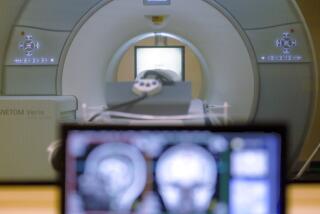Fates Enlist ‘Accidental Tourist’ in Mental Illness War
- Share via
If the Fates hadn’t intervened in that whimsical manner that is their wont, Jean Liechty may never have given a hoot about the Brain Imaging Center at UC Irvine. She might have been intrigued by what research the people in the lab coats were doing in the building next to the cow pasture, but then her attention would have been diverted elsewhere.
So many causes, so little time.
But the Fates did come knocking on the Liechty family door about 15 years ago, transforming Liechty from an otherwise casual observer to a mother with a soldier’s passion in the war against mental illness.
Her eldest son, one of four children, was found when he was a teen-ager to have a form of schizophrenia. It isn’t the kind of news you invite the neighbors over to tell them about. In fact, it’s not something that Liechty is all that gung-ho about telling today, even though she knows in her heart of hearts that not talking about mental illness contributes to society’s inability to deal with it.
For many Americans, mental illness was always a subject we tippy-toed around. It was the cousin your parents didn’t want you to hang around with; the uncle who acted a “little strange.”
Because of progress at places such as UCI, that is slowly changing.
But it was the Liechtys’ experience with their son that helped drive Jean Liechty to become the founding president of the Brain Imaging Center Committee, a group of private citizens that tries to raise money and public awareness of UCI’s research effort.
“When we took our son for help, and we took him to many places,” Liechty said Tuesday in her Linda Isle home, “we were told, ‘We’ll study you and see what’s wrong with you. Then we’ll know what’s wrong with him.’ . . . To be told that you caused this was absolutely hideous. That your child could be so sick, this child that you loved. Even now I can’t even think about it. It is absolutely unconscionable.”
These are no mother’s idle complaints. Today’s researchers concede that mental illnesses in years past were among the most misdiagnosed of all ailments.
“Jean’s story of having a child with schizophrenia is a very typical story in terms of the way it was first diagnosed, the way it came to doctors’ attention, how it was misdiagnosed and how she was made to feel it was her fault. And this is a very typical story of that generation,” said Richard Haier, professor of psychiatry and human behavior at UCI and associate director of the Brain Imaging Center. “Nowadays, it’s a little less likely that parents will be blamed because it’s so thoroughly regarded as a brain disease.”
As Liechty got involved with the committee, she discovered an amazing thing. Other county families, some of wealth and privilege and some not, joined in. They shared stories of pain and sorrow and, increasingly, of hope for better futures.
“You know the movie ‘The Accidental Tourist?’ ” Liechty said. “I’m sort of the accidental person who never would have had anything to do with this. I wouldn’t have known anything about it. But now I know so many people who have ill family members.”
I asked whether she would have been interested if a family member had not been involved.
“I wouldn’t have wanted to know,” she said. “And this is part of the stigma. People didn’t want to know; they were kind of afraid. It has been so interesting to watch people come out of the closet.”
“Interestingly,” she added, “AIDS has made mental illness more socially acceptable because if people can talk about and have compassion for people with AIDS, and I certainly believe they should, how can you deny that concern” over mental illness?
The committee Liechty founded wants to raise about $3 million to help pay for equipment needed for the research. “It’s been so hard to raise money,” she said. “In the larger picture, the money we need to raise is not that great a sum. It’s just a drop in the bucket.
“But many people have a perception that people who are mentally ill or have something wrong with their brains could pull themselves up by their bootstraps if they wanted to. People say, ‘I’ve been depressed, but I just got myself up and got going again.’ ”
In the real world, it doesn’t always work that way.
However, Haier said, researchers are hopeful.
“The reason for that optimistic view is that President Bush has declared the 1990s as the decade of the brain, and he’s done it on the basis of the pace of research advances in neurosciences. By the end of the ‘80s, research was going so well and there were so many discoveries that people felt the decade of the ‘90s would be the decade where we would turn the key to some of the brain’s most closely held secrets.”
On Monday, the Brain Imaging Center is sponsoring a free symposium and tour. Speakers will discuss recent advances in brain research in language geared to the layman, Haier said. If you’re interested, call (714) 856-4245.
Don’t be daunted by the complex brain-imaging equipment or the terminology. Remember, behind all the big words and sophisticated research are flesh-and-blood families with troubled souls.


